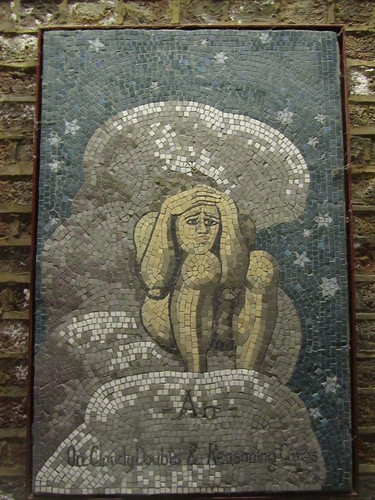Northrop Frye, in Fearful Symmetry, provides this insight into the youngest son Satan:
"Satan, on the other hand, is the prince of this world: he is the spirit of inertia which incarnates itself in compromise. The worshipers of Satan accept established religions, philosophies, and social conditions because they are established; they observe all the commandments of the law from their youth upwards, and their days are long and peaceful in the lands they possess. They, therefore, are 'The Elect from before the foundation of the World,' and their worldly prosperity is a sign of their inward grace." (Page 333)
 |
Wikipedia Commons Milton Copy D, Plate 18 |
So Satan's task is to create the structure of the conventional
mechanics which will keep the system operating. In the Freudian
psyche this function is performed by the ego; in Jungian
psychology it is performed by the function Reason. In much of
Blake's mythology Urizen is the agency of attempting to provide
this framework.
In the Bard's Song we have a blatant attempt of Satan to trade the task of providing a structure in which the imagination may reside, for the agency which feeds the imagination: vision. In the Bard's Song it is Palamabron who is the visionary torn between the desire to communicate his vision and the demands of society to conform to the ordinary regulations of his culture. Palamabron agrees to allow Satan to open himself to receiving and transmitting visions from Eternity, but Satan has no faculty for accessing the intuitive. Likewise Palamabron lacks the organizational skills to keep society's machinery working.
Milton, Plate 4, (E 98)
"Satan was going to reply, but Los roll'd his loud thunders.
Anger me not! thou canst not drive the Harrow in pitys paths.
Thy Work is Eternal Death, with Mills & Ovens & Cauldrons.
Trouble me no more. thou canst not have Eternal Life
So Los spoke! Satan trembling obeyd weeping along the way."
Milton, Plate 7, (E 100)
"The first, The Elect from before the foundation of the World:
The second, The Redeem'd. The Third, The Reprobate & form'd
To destruction from the mothers womb: follow with me my plow!
Of the first class was Satan: with incomparable mildness;
His primitive tyrannical attempts on Los: with most endearing love
He soft intreated Los to give to him Palamabrons station;
For Palamabron returnd with labour wearied every evening
Palamabron oft refus'd; and as often Satan offer'd
His service till by repeated offers and repeated intreaties
Los gave to him the Harrow of the Almighty; alas blamable
Palamabron. fear'd to be angry lest Satan should accuse him of
Ingratitude, & Los believe the accusation thro Satans extreme
Mildness. Satan labour'd all day. it was a thousand years
In the evening returning terrified overlabourd & astonish'd
Embrac'd soft with a brothers tears Palamabron, who also wept
Mark well my words! they are of your eternal salvation
Next morning Palamabron rose: the horses of the Harrow
Were maddend with tormenting fury, & the servants of the Harrow
The Gnomes, accus'd Satan, with indignation fury and fire.
Then Palamabron reddening like the Moon in an eclipse,
Spoke saying, You know Satans mildness and his self-imposition,
Seeming a brother, being a tyrant, even thinking himself a brother
While he is murdering the just; prophetic I behold
His future course thro' darkness and despair to eternal death
But we must not be tyrants also! he hath assum'd my place
For one whole day, under pretence of pity and love to me:
My horses hath he maddend! and my fellow servants injur'd:
How should he[,] he[,] know the duties of another? O foolish forbearance
Would I had told Los, all my heart! but patience O my friends.
All may be well: silent remain, while I call Los and Satan."
Luke 10[30] And Jesus answering said, A certain man went down from Jerusalem to Jericho, and fell among thieves, which stripped him of his raiment, and wounded him, and departed, leaving him half dead.
[31] And by chance there came down a certain priest that way: and when he saw him, he passed by on the other side.
[32] And likewise a Levite, when he was at the place, came and looked on him, and passed by on the other side.
[33] But a certain Samaritan, as he journeyed, came where he was: and when he saw him, he had compassion on him,
[34] And went to him, and bound up his wounds, pouring in oil and wine, and set him on his own beast, and brought him to an inn, and took care of him.
.





